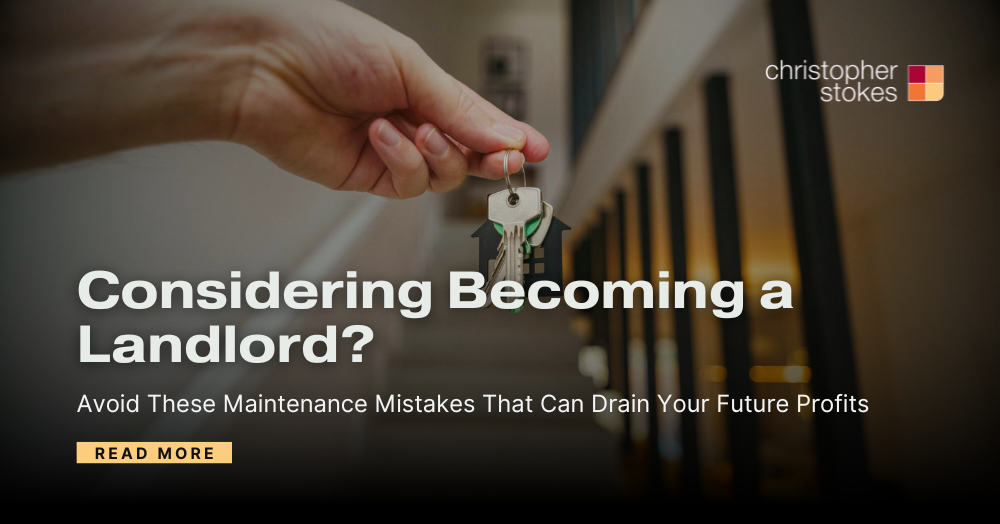
Considering Becoming a Landlord? Avoid These Maintenance Mistakes That Can Drain Your Future Profits
Thinking about entering the rental market? Smart move. But before you dive in, understanding common maintenance pitfalls is crucial. Get it wrong, and your potential profits could quickly disappear.
Are you weighing up the pros and cons of becoming a landlord? It's an exciting prospect, offering a steady income stream and long, term capital growth. However, many aspiring landlords underestimate the importance of proactive property maintenance. Neglecting this area can lead to significant financial headaches down the line, eroding your hard, earned profits before they even materialise.
Ignoring Small Issues Until They Become Big Problems
It's tempting to put off minor repairs, especially when you're just starting out. A dripping tap, a loose tile, or a faint damp smell might seem insignificant. But these small issues rarely fix themselves. Instead, they often escalate into costly, time, consuming problems. A dripping tap can lead to water damage and higher utility bills for your tenant. A loose tile could indicate a deeper structural issue. And damp? That's a red flag for potential mould, which is a major health hazard and a nightmare to rectify.
Actionable Tip: Implement a regular inspection schedule, even before your first tenant moves in. Address any minor repairs immediately. Think of it as preventative medicine for your property. This proactive approach saves money and stress in the long run.
Cutting Corners on Quality Repairs and Materials
When you're trying to maximise your initial investment, it's easy to be swayed by the cheapest repair quotes or materials. However, this is often a false economy. Low, quality repairs tend to fail sooner, requiring repeat work and further expense. Inferior materials might not stand up to the wear and tear of tenancy, leading to more frequent replacements.
Actionable Tip: Always opt for durable, good, quality materials and reputable tradespeople. While the upfront cost might be slightly higher, the longevity and reliability will pay dividends. Your property will maintain its value, and you'll have fewer tenant complaints about recurring issues. We understand what buyers and tenants are looking for right now, and quality finishes always stand out.
Neglecting Regular Safety Checks and Compliance
As a future landlord, you'll have legal responsibilities to ensure your property is safe and compliant with regulations. This includes gas safety certificates, electrical checks, and fire safety measures. Failing to conduct these checks isn't just a financial risk, it's a legal one, potentially leading to hefty fines or even imprisonment.
Actionable Tip: Familiarise yourself with all landlord safety regulations before you let your property. Schedule annual gas safety checks and regular electrical inspections. Keep meticulous records of all certificates and maintenance work. This protects both your tenants and your investment.
Underestimating the Importance of Good Tenant Relations
While not strictly a maintenance mistake, poor tenant relations can indirectly lead to maintenance issues. Tenants who feel valued and respected are more likely to report problems promptly and look after the property. Conversely, unhappy tenants might neglect reporting issues or even cause damage.
Actionable Tip: Foster open communication with your tenants from day one. Provide clear instructions on how to report maintenance issues and respond quickly when they do. A happy tenant is often a long, term tenant, reducing void periods and the associated costs of re, letting and potential damage.
Not Budgeting for Unexpected Repairs
Even with the best preventative maintenance, things will inevitably go wrong. Boilers break down, roofs leak, and appliances fail. Many new landlords fail to set aside a dedicated fund for these unexpected costs, leading to financial strain when they arise.
Actionable Tip: Create a contingency fund specifically for property maintenance and unexpected repairs. A good rule of thumb is to budget around 1% of the property's value annually for maintenance. Having this buffer means you can address issues quickly, preventing them from escalating and keeping your tenants happy.
Becoming a landlord is a rewarding venture, but it requires careful planning and a proactive approach to property management. By avoiding these common maintenance mistakes, you'll protect your investment, ensure tenant satisfaction, and ultimately, secure your profits.
Ready to take the next step in your landlord journey? We offer free valuations and expert advice to help you understand your property's potential. Contact us today for a no, obligation chat about your investment goals.

